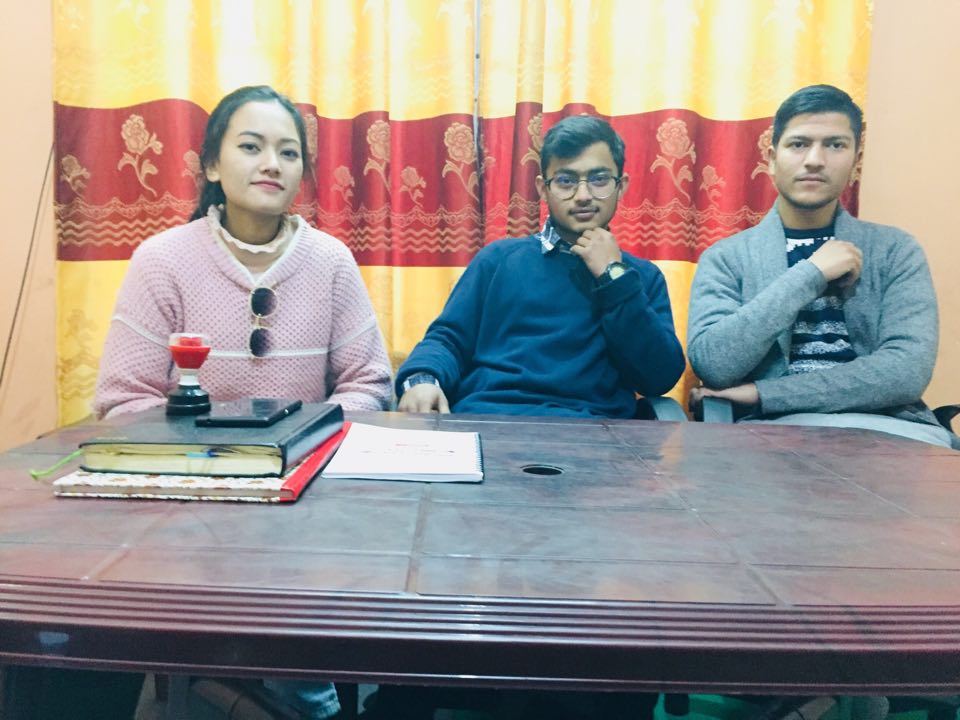The rapid entry and growth of small social enterprises have constituted one of the most important aspects of development in Nepal. The combined efficiency and innovation of business with compassion and insight of welfare to the people of society results in a new substantial way to fight poverty, hunger, illness, and inequality.
Kripesh Ghimire is an enthusiastic teen. In a blending effort of his friends Nikita Khadgi, and Bibek Timalsina, he has pioneered profitable women empowering business named ‘Mokshya’. These teens who had never known that life would offer them with such opportunity in their career perspective are now implying their efforts to undergo a new taste within a curious heart.
Kathmandu like many districts around Nepal has its fair share of poor people especially local women, wives of prisoners and their children, in rags standing in front of you, obviously lead someone to the overwhelming desire of helping them. To many people like Ghimire arriving in the streets of Koteshwor, Swoyambhu, and Pashupatinath, it can be a bit of shock to see the ragged condition of people living in these areas. People need some reasons to get out of such ragged street, but not to stay on them. But, Kripesh knew he wanted to help these people. This led to the formation of ‘Mokshya’.
Therefore, he planned to teach those women aligned on the poverty line and slowly help them to deal with their poverty. He came up with an idea so as to train local women, female prisoners, and wives of prisoners knitting clothes and selling them to the markets. With enough mindset for the initiation of this business, Kripesh shared his idea with Ujjwal Mainali, the CEO of Univhub, with whom he acquired some knowledge of business initiations, markets and its strategies in Nepal. This was an inspiration for him to stimulate his innovative idea.
“Mokshya not only provides an opportunity to knit a raw piece of wool but also gives classes for those who are totally naïve regarding the skills of knitting wool. We are functioning with the motto of ‘By Us, For Them’.” Kripesh shared.
Since the inception of Mokshya, they are gaining success to generate helping hands for the company. They are delighted that all the trainees have got learning attitude inside them and this is making the company even more productive. The training classes run for 5 days, excluding Friday and Saturday. Till date, about 15 female trainees have promised to work for Mokshya after completing the training. These women will be facilitated with training rooms, free knitting training and materials required to make the products.
According to Kripesh, it takes these women about a week to knit a sweater. A fast knitter can finish the work within 16-18 hours. Not only keeping sweaters as their soul product is the aim, but they are also focusing on other items too such as mufflers, gloves and caps to gain surplus advantages of handling products and making the employees deal with the hobby of knitting. Till date, Mokshya has produced a total of 600 purses.
Mokshya initially had to face some challenges in the settling the training center. As per the agreement between the workers, trainer and the owners, Mokshya is now located in Gopikrishna, Chabahil. Currently, they are facing problems to persuade women from poor economic background to come up to the training center and work but most of them feel uncomfortable to express their needful situation.
“For those who are working with us, Mokshya is incomplete without their hard work. We are very thankful towards them for trusting themselves, us and their trainer who is assisting them to initiate the work. We duly welcome as much assisting hands as we could in this company.” Kripesh opens.
Similarly, Ghimire is optimistic to franchise this company in the coming days to different districts of Nepal as it is affiliated with financial hardship. His sole aim is to cope up with different women from different geographical backgrounds and slowly help them in eradicating their financial and social problems.
“To the teens out there like me, who are constantly focusing themselves on applying abroad, you better have a dignified life within your own country, use your knowledge and skills to utilize the local resources for the development of your own community,” mentioned Kripesh.
By: Manisha Bagale







